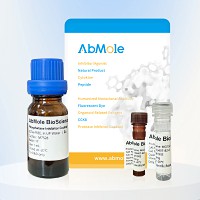
Anti-Mullerian hormone (AMH/MIS), a member of the TGF-beta superfamily, is produced by granulosa cells (GCs) of preantral and small antral follicles and plays a role in regulating the recruitment of primordial follicles and the FSH-dependent development of follicles. AMH is widely used for assessing ovarian reserve, and it is particularly convenient, because it is thought to have minimal variability throughout the menstrual cycle. AMH can also be used as a surrogate diagnostic marker of polycystic ovary syndrome (PCOS).
AMH is responsible for normal male sexual differentiation, and circulating AMH is used as a marker of testicular tissue in newborns with disorders of sex development. Anti-Mullerian hormone (AMH) produced in the developing testis induces the regression of the Mullerian duct, which develops into the oviducts, uterus and upper vagina. As well as other hormone receptors, and a decreased ovarian cortex cell proliferation.
The recombinant human AMH consists of 555 amino acids and predicts a molecular mass of 59.1 kDa.
A DNA sequence encoding the human AMH (NP_000470.2) (Leu25-Arg560) was expressed with a polyhistidine tag at the N-terminus.
Lyophilized from sterile 20 mM Tris, 150 mM NaCl, pH 8.0.
| Form | Lyophilized powder |
| Solubility (25°C) | Reconstitute the lyophilized powder in distilled water up to 250 μg/ml. |
| Storage | Stable for up to twelve months from date of receipt at -20℃ to -80℃ |
| Species | Mouse | Rat | Rabbit | Guinea pig | Hamster | Dog |
| Weight (kg) | 0.02 | 0.15 | 1.8 | 0.4 | 0.08 | 10 |
| Body Surface Area (m2) | 0.007 | 0.025 | 0.15 | 0.05 | 0.02 | 0.5 |
| Km factor | 3 | 6 | 12 | 8 | 5 | 20 |
| Animal A (mg/kg) = Animal B (mg/kg) multiplied by | Animal B Km |
| Animal A Km |
For example, to modify the dose of Compound A used for a mouse (20 mg/kg) to a dose based on the BSA for a rat, multiply 20 mg/kg by the Km factor for a mouse and then divide by the Km factor for a rat. This calculation results in a rat equivalent dose for Compound A of 10 mg/kg.
| Related Recombinant Proteins Products |
|---|
| Recombinant Human Serpin A12 (E.coli, N-GST)
Vaspin (Visceral Adipose-Specific SERPIN) is a newly described adipokine. Vaspin is also a unique insulin sensitizing adipocytokine in obesity. |
| Recombinant Human B2M Protein (Mammalian, C-6His)
β-2-Microglobulin (B2M) is a secreted protein with 1 Ig-like C1-type (immunoglobulin-like) domain which belongs to the beta-2-microglobulin family. B2M may adopt the fibrillar configuration of amyloid in certain pathologic states. |
| Recombinant Mouse E-Selectin/CD62E Protein (HEK293)
E-selectin, also known as endothelial leukocyte adhesion molecule-1 (ELAM-1) and CD62E, is an inducible adhesion molecule that is expressed on the surfaces of stimulated vascular endothelial cells and is sometimes involved in cancer cell metastasis. |
| Recombinant Human DPP4/CD26 (Mammalian, C-6His)
DPP4/CD26 is a signal-anchor for type II membrane protein that belongs to the peptidase S9B family. DPP4/CD26 acts as a positive regulator of T-cell coactivation, by binding at least ADA, CAV1, IGF2R, and PTPRC. It’s binding to CAV1 and CARD11 induces T-cell proliferation and NF-kappa-B activation in a T-cell receptor/CD3-dependent manner. |
| Recombinant Human USP14 (E.coli, N-6His)
USP14 belongs to the ubiquitin-specific processing (USP) family which is a deubiquitinating enzyme (DUB) with His and Cys domains. USP14 acts also as a physiological inhibitor of endoplasmic reticulum-associated degradation (ERAD) under the non-stressed condition by inhibiting the degradation of unfolded endoplasmic reticulum proteins via interaction with ERN1. |


Products are for research use only. Not for human use. We do not sell to patients.
© Copyright 2010-2023 AbMole BioScience. All Rights Reserved.
